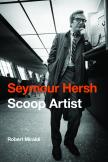Breaking Stories
In the fall of 1969, as the Vietnam War raged, America convulsed with political and cultural turmoil so searing that we still invoke much of it with just a few words.
Woodstock. Chappaquiddick. The Chicago 7.
One other term soon would overshadow them all: My Lai.
As the nation’s press corps focused on the year’s extraordinary events, one tenacious young reporter earning a mere $8,000 a year had another untold story in his sights. His name was Seymour Hersh. He worked alone. And he was chasing a tip that U.S. soldiers had massacred hundreds of unarmed civilians in a Vietnam village.
The hunt led Hersh on an epic search for the Army lieutenant reputed to be at the center of the atrocity, William Calley. He was stationed at the Army’s sprawling Fort Benning base in Georgia. Hersh had no idea how to find him. Military officials were no help. But he refused to give up. After long days of dead ends, Hersh knocked on doors around the base for hours. Still no luck. Then he went to the extreme of standing in a parking lot, stopping cars and asking drivers if they knew Calley.
Finally, one officer agreed to talk, over drinks. A few rounds later, he introduced him to Calley, who agreed to an interview. Hersh had his shocking story. The nation’s perception of the war in Vietnam would never be the same.
That remarkably relentless tale is among many bursting from the pages of Robert Miraldi’s Scoop Artist, an illuminating biography of Hersh, who is unquestionably one of the world’s most important—and controversial—journalists of the past 50 years.
Miraldi, a longtime professor of journalism at the State University of New York, New Paltz, does exceptional work bringing Hersh to life as an archetypal character of his trade: his always-loosened tie, his round-the-clock calls to sources, his endless battles with aggravating editors as he fearlessly pursues the truth.
Even at the height of his fame, Hersh kept all his phone numbers listed publicly—ever ready to receive his next blockbuster tip. Then there’s his astonishing work ethic: for his book on Henry Kissinger, Hersh conducted more than 1,000 interviews.
But Scoop Artist is not hagiography. With a critical eye, Miraldi also scrutinizes Hersh’s signature reporting style, like his constant and at times questionable reliance on anonymous sources, which has been widely emulated in investigative journalism. He also portrays Hersh as at times a self-promoting egotist, hard-charging to the point of parody. This Hersh cravenly calls a Pulitzer Prize judge to probe whether he’s going to win. He also refuses to cooperate with The Columbia Journalism Review when it dares to try to examine the accuracy of his work.
The roots of Hersh’s pugnacity are on vivid display, too. Hersh, the son of Jewish immigrants, grew up on Chicago’s tough South Side, flunked out of law school, bailed quickly from business school and worked as a drug-store clerk selling liquor to the likes of novelist Saul Bellow before stumbling into journalism.
One of the best parts of Scoop Artist is early in the book, as Miraldi shows Hersh rising as a reporting grunt through the romantic, rough-and-tumble world of Chicago journalism, roaming the streets and pounding out daily stories on deadline. He eventually finds his way to a job at the Associated Press in Washington, D.C., where he gets a taste of covering the Pentagon beat and national security issues. A short, strange detour into politics follows, as Hersh becomes a public-relations man for the insurgent 1968 presidential campaign of Senator Eugene McCarthy of Minnesota—a stint that ended acrimoniously. Then Hersh shifts to the single-minded pursuit of uncovering secrets and deceit at the highest levels of government power, first as a prominent reporter for The New York Times through the 1970s (that ends in acrimony, too) and later for The New Yorker.
Incredibly, for decades, from his Pulitzer-Prize winning revelations about the Vietnam My Lai massacre to his exposure of the brutal Abu Ghraib prison abuses of the Iraq War, Hersh’s investigative reporting is at the center of almost every big national story. He stalks Nixon on Watergate, at times scooping the Washington Post’s duo of Woodward and Bernstein, and for years he scorches Kissinger on Vietnam. He exhaustively exposes domestic and foreign abuses by the Central Intelligence Agency, and he probes the seamy underworld behind the regal glow of John F. Kennedy’s Camelot.
Hersh’s career is so compelling that it easily overcomes a few shortcomings in Scoop Artist. Miraldi sometimes awkwardly interrupts his narrative to note the perspective of scholars on Hersh’s reporting, which is instructive but a tad too academic. The author’s writing also occasionally drifts into cliché (Hersh and Calley, he writes, seemed “like oil and water”) or the incessant use of the same phrasing, such as Hersh “smelling” yet another scoop or another Pulitzer.
True to form, it also appears that Hersh, now 78 and still a working journalist, never came around to fully cooperating with Miraldi. Maybe he’s still too busy or just not the type to spend much time on self-reflection. Near the end of Scoop Artist, Hersh does offer brief and eloquent testimony about the neeed for the news business to hold the nation’s leaders accountable.
“That’s my soul,” he says.
But it is left to Miraldi and others to assess Hersh’s legacy, how it helped alter the course of American history and how it offers lessons—and cautions—to a next generation of journalists.
Never follow the pack. Never become the story. And always remain, in the words that the former New York Times editor Max Frankel uses to extol Hersh, “a reporter first of all.”
This article also appeared in print, under the headline “Breaking Stories,” in the November 9, 2015, issue.








